|
I am often asked how to best turn a marine solar system on and off and if doing so will damage the panels. Below are some thoughts:
The solar controller is powered by your batteries, not your solar panels so you don't want to disconnect the controller from the battery bank to shut down you solar system as the controller will need to reboot and reset each time it is powered up. Rather, the proper way to turn off or shut down your solar system is by opening the positive wire from your solar array to your controller. We suggest a simple on/off switch in the positive wire from the solar array to the controller. Turning the solar array on and off with this switch will do no damage to the solar system. There is a reason it is desirable to be able to shut down the solar system with the switch or breaker between the solar panel and the controller. When charging off the alternator, you want maximum output going to the battery bank for bulk charging until the batteries are up to proper voltage. Some alternators, especially alternators with smart regulators sense the state of charge of the battery bank and determine to apply either a bulk or a float charge. If the panels are connected and producing, the regulator of the alternator will see the sum of the battery charge plus the solar charge coming from the panels. This apparent heightened state of charge may result in the regulator putting the alternator in float mode prematurely because it thinks the battery bank state of charge is higher than it really is. The same applies for the shore charger. This condition only occurs with certain combinations of alternator regulators, solar controllers and shore power chargers. Most of the time it is not an issue. Confused? As a general rule, to be certain of getting the maximum performance from your engine alternator and your shore charger, open the solar breaker when they are in use. Otherwise, experiment with your equipment and see if there is interference between the units as described above. If not, leave the solar system on all the time; that is what we do.
18 Comments
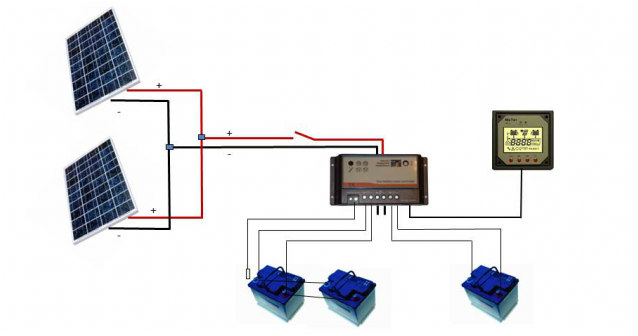 Wiring Diagram for a Two Solar Panel System, a Dual Output Solar Controller and Two Battery Banks Wiring Diagram for a Two Solar Panel System, a Dual Output Solar Controller and Two Battery Banks We are often asked questions about how to wire a solar system. This can appear to be a daunting task for those new to the world of solar but it is actually quite easy and straight forward. In this blog I will walk you through the wiring process for our dual output controller step by step. First, the definition of a few terms: * MC4 Connector - A water proof connector used in solar wiring. Most solar panels come with MC4 connectors attached to 3 foot solar wire pigtail coming from the panel junction box. These connectors are easily disconnected. * Solar Controller - Except for small trickle charge systems, all solar systems should have a solar controller. The purpose of a controller is to prevent batteries from being overcharged, apply the optimal charging current to the battery bank and prevent current from back flowing from the batteries to the solar panel at night. Controllers are sized by their amperage capacity. Controllers designed for residential and commercial (lighting) use are generally overkill and not well suited for marine applications. * Temperature Sensor - This device is connected to the controller and senses the temperature of the battery bank. If the batteries are heating up due to heavy charging, the sensor signals the controller and the controller reduces the charge current appropriately. A temperature sensor is only useful for systems with larger solar arrays as smaller solar systems do not provide sufficient power to over heat the batteries. * Solar Wire - While most any wire can be used in a solar system, solar wire is designed for maximum conductivity and is well insulated with a UV resistant cover. It is typically single conductor and the insulation is .25 Inches in diameter. The wiring diagram below is taken from our dual output controller manual and illustrates the basic wiring required for a two panel system, a dual output controller and two battery banks. Most solar controllers are single output so charge only one battery bank. In this case, it is common to wire the positive wire to the common on the battery 1-2-both battery switch to select which battery bank is to be charged. A few things to note in the diagram: * The two solar panels are wired in parallel using an MC4 T-branch connector, If one panel is shaded, the other panel will still provide full power to the controller. * There is a switch in the positive wire between the solar panel and the controller. This is optional. The purpose of the switch is to turn off the panel should it interfere with the alternator output when the auxiliary engine is generator is running. It has been reported that some smart regulators are confused by the power coming from the solar panel. It sees the sum of the battery charge plus the panel output and senses the batteries are fully charged so goes into float mode prematurely. This is easily remedied by flipping the switch thus disconnecting the solar panel. * The optional temperature sensor is shown to the left of the larger house battery bank. It is simply taped on to the top of the battery. * If you have a battery monitor such as a Link or Xantrex 1000 or 2000, it is important to connect the negative wires from the controller to the shunt of the battery monitor. Otherwise, the monitor doesn't see the power coming in from the solar panel and will give inaccurate readings. * There is a sequence to follow in connecting the solar system. Connect the controller to the battery banks first. Then connect the solar panel to the controller. |
Categories
All
AuthorThomas Trimmer has been cruising with his Ericson 38 sailboat on the Great Lakes for over 20 years. He has pioneered the use of solar energy for wilderness cruising. He is continually designing and building equipment to simplify and enhance the cruising experience. Archives
April 2024
|
Efficiently Powering Your Vessel/Van. Call/email/chat any time, we're happy to help you work through designing your solar system.
Home Page Solar Panels Mounting Kits Product Page Marine Solar Systems Gallery of Installations Customer Comments Contact Us
Call 248 705-8337 or email [email protected]
Article On How To Size Your Solar Panels For Your Boat
Customer Reviews Return Policy Privacy Policy Shipping Times/Rates
Home Page Solar Panels Mounting Kits Product Page Marine Solar Systems Gallery of Installations Customer Comments Contact Us
Call 248 705-8337 or email [email protected]
Article On How To Size Your Solar Panels For Your Boat
Customer Reviews Return Policy Privacy Policy Shipping Times/Rates

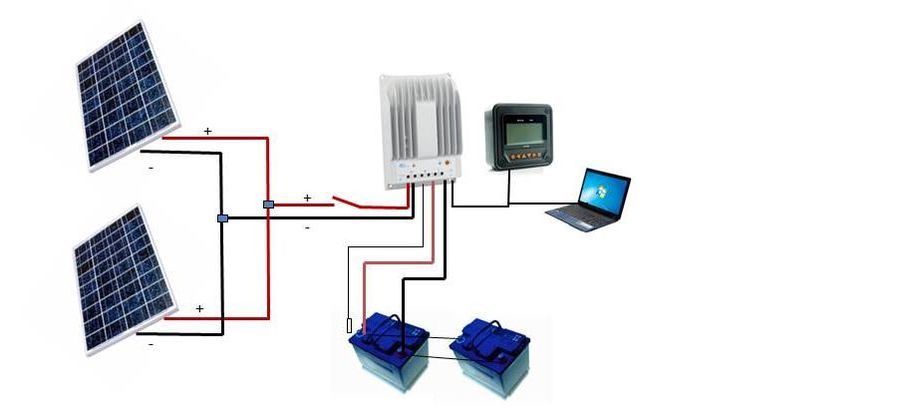
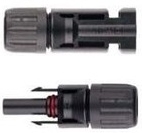
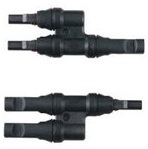

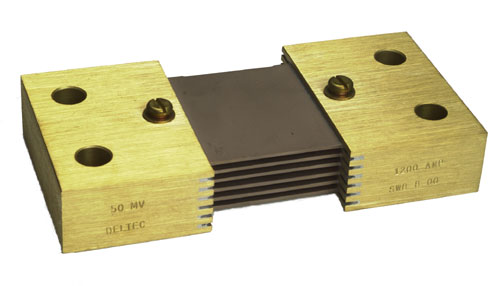
 RSS Feed
RSS Feed